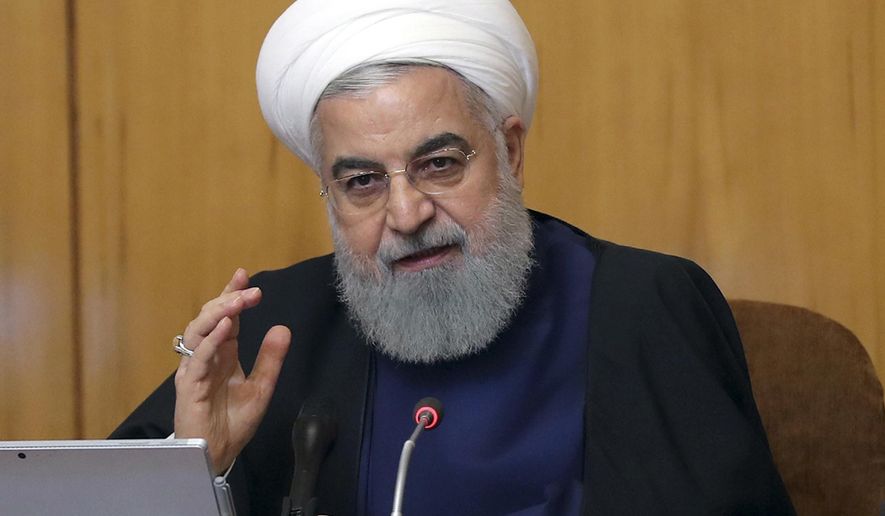Iranians are under “unprecedented” pressure by global sanctions and could face harsher economic conditions than they felt during the 1980s war with Iraq, now that the U.S. has expanded its efforts to apply military and economic pressure, Iranian President Hassan Rouhani said this weekend.
President Trump recently announced a fresh set of sanctions targeting Iranian industrial metals such as iron, steel, aluminum and copper, and moved to uphold a global embargo on Iranian crude oil to thwart the Islamic Republic’s influence in the Middle East.
Administration officials said that the sanctions are designed to bite Iran’s economy beyond the oil sector, which provides most of the nation’s wealth, and that Mr. Trump is prepared to go further if provoked.
“During the war we did not have a problem with our banks, oil sales or imports and exports, and there were only sanctions on arms purchases,” Mr. Rouhani said Saturday to political activists in Tehran.
The eight-year conflict between Iran and Iraq left a half-million people dead and ended after Tehran accepted a cease-fire brokered by the United Nations.
The Iranian president said that while “the pressures by enemies is a war unprecedented in the history of our Islamic revolution … I do not despair and have great hope for the future and believe that we can move past these difficult conditions provided that we are united,” the BBC reported.
Mr. Rouhani’s comments come at a crucial moment of increasing hostility between the U.S. and Iran. The Trump administration last week deployed an aircraft carrier and bomber task force to the Middle East in response to growing concern that Tehran-backed militias were plotting an attack against American forces in Iraq.
Tensions spiked Sunday, when the United Arab Emirates reported that four commercial ships off of the country’s eastern coast that “were subjected to sabotage operations,” according to The Associated Press. The claim came hours after Iranian and Lebanese media broadcasts aired reports of explosions at an Emirati port, that were later deemed false.
Emirati officials have not released additional information on the incident, but the U.S. has warned local ships that “Iran or its proxies” may target maritime traffic in the region, according to the AP.
Although the Trump administration has stressed that the U.S. is not seeking war with Iran, officials have provided few details about last week’s threat from Iran that spurred Mr. Trump’s decision to deploy the USS Abraham Lincoln Carrier Strike Group and a bomber task force two weeks before it was scheduled to replace the existing carrier in the region.
The Pentagon has since approved the movement of additional forces to the region, the USS Arlington and a Patriot Battery “in response to indications of heightened Iranian readiness to conduct offensive operations against U.S. forces and our interests,” according to a Defense Department spokesperson.
Top Iranian military officials, meanwhile, see the U.S. military’s movements as less threatening than in the past.
A senior commander of the Islamic Revolutionary Guard Corps (IRGC) said that while U.S. military presence in the Arabian Gulf used to be alarming, he sees it today as an opportunity, according to the state-run Iranian Students’ News Agency.
“An aircraft carrier that has at least 40 to 50 planes on it and 6,000 forces gathered within it was a serious threat for us in the past but now … the threats have switched to opportunities,” said Amirali Hajizadeh, who leads the IRGC’s aerospace division. “If [the Americans] make a move, we will hit them in the head.”
Maj. Gen. Hossein Salami, the IRGC’s commander, said he sees the latest moves as a “psychological war” rather than a combatant conflict, Reuters reported citing an Iranian news site.
In a summary of Gen. Salami’s statement in a parliamentary session, Behrouz Nemati, a member of parliament, said “Commander Salami, with attention to the situation in the region, presented an analysis that the Americans have started a psychological war because the comings and goings of their military is a normal matter.”
Despite optimism from Iranian officials, the deployment of U.S. forces was quickly met with threats from Iran that it may restart key aspects of its nuclear program.
This week, Iran delivered an ultimatum to the U.S. and its allies and demanded to rework a comprehensive nuclear deal within the next 60 days, or Tehran will quickly ramp up its uranium enrichment operations to near weapons-grade levels.
The demand came exactly a year after Mr. Trump pulled the U.S. out of the multinational Obama-era nuclear accord, formally known as the Joint Comprehensive Plan of Action, which allowed Iran to enrich uranium up to 3.67% — enough to fuel nuclear power plants used for peaceful purposes.
U.S. officials have said the administration has no intention of easing the pressure, particularly if Iran begins high-level uranium enrichment operations.
• Lauren Toms can be reached at lmeier@washingtontimes.com.




Please read our comment policy before commenting.